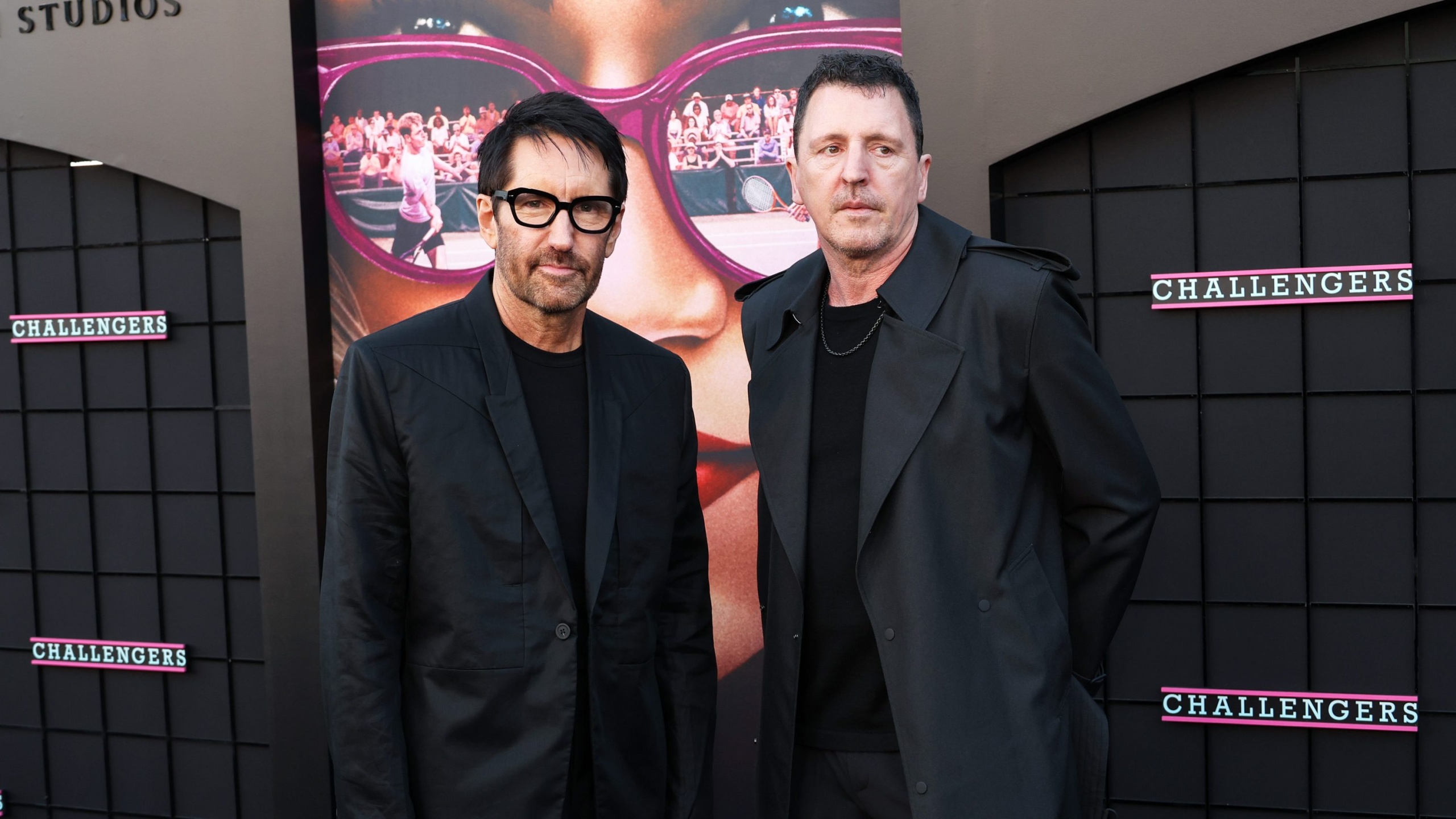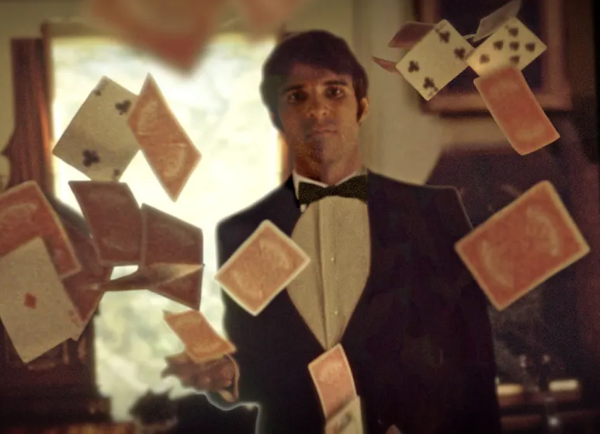Any “Twin Peaks” fan worth their garmonbozia knows Episode 8 of David Lynch and Mark Frost’s revival season “The Return,” from 2017, is the visual and thematic standout. Directing, Lynch traces the origins of an evil presence named Judy — rooting it back to the U.S.’s development of the atomic bomb — in an episode that explains where the series-legacy killer “BOB” came from and how that force has landed now-dazed FBI agent Dale Cooper (Kyle MacLachlan) in a detached red-room netherworld.
But one of the centerpieces of the iconic episode is a visceral performance courtesy of “THE” Nine Inch Nails, in the red-lit Twin Peaks Roadhouse Bar, of “She’s Gone Away,” a violent, grunge-fueled ode to destruction and the places you dig into “’til your fingers bleed.” The song was a track on Nine Inch Nails’ 2016 EP “Not Actual Events,” an angry and haunting and weirdly dance-friendly (certainly given the writhing Roadhouse crowd in the episode) ballad Lynch integrated into the series (with some rawer, sonic updates) alongside ballads from artists like Sharon Van Etten, Au Revoir Simone, Chromatics, “Mulholland Drive” star Rebekah Del Rio, and more of the indie musicians he adores. (Sky Ferreira popped up on in the show as a rash victim though did not sing.)
Nine Inch Nails frontmen Trent Reznor and Atticus Ross (he officially joined the group in 2016) are back in the awards season mix this year for their scores for “Queer” and “Challengers,” two films from Luca Guadagnino. They began teaming up as proper film composers in 2011 for David Fincher’s “The Social Network” and have since gone on to score films including Fincher’s “The Girl with the Dragon Tattoo,” “Gone Girl,” “Mank,” and “The Killer,” plus “Bones and All” for Guadagnino, and the scores for Jeff Rowe’s “Teenage Mutant Ninja Turtles: Mutant Mayhem” and Pete Docter’s Pixar film “Soul.”
“Twin Peaks: The Return” audiences already familiar with the soundtrack’s guests will realize that all of the performances onstage are not, in fact, organic in-camera songs-and-dances but instead lip-synced versions of album recordings pasted over live onstage moments. Such is the case of “She’s Gone Away,” which is woven into a delirious Episode 8 about the evil underpinnings of the “Twin Peaks” mythology, dropped into the middle of the episode, whereas the melancholic Roadhouse performances were normally saved for the end credits. IndieWire, speaking to Reznor and Ross about their awards-contenders scores, brought up the all-time collaboration with Lynch.
“Because of the nature of [the episode], we were passing Eddie Vedder [who played the Roadhouse in the previous episode], it’s kind of a ‘wait up here do your thing,’ that decision [to lip-sync the episode]… we recorded this track knowing we would be lip-syncing the track,” Reznor told IndieWire. Though, he said, “It was intentional to make it feel like we were playing it live.”
“We didn’t produce it in a fussy [way]. It’s meant to have a raw quality,” added Atticus Ross, who said the band spent only one day on-location in Washington before Lynch brought them back to his own home in Los Angeles to watch the footage.

“We know David [Lynch], and we love David. We didn’t get to peek behind the curtain at anything. When he wanted to show us the footage, after we filmed it, he’s like, ‘I want everyone’s approval. I don’t want to surprise anyone. So I am going to play you your scene. So come over,’” said Reznor, who first met Lynch when he produced the soundtrack to his 1997 “Lost Highway.” In 2013, Lynch supplied visuals for the Nine Inch Nails song “Came Back Haunted.”
“We knew nothing about [what ‘Twin Peaks’ was going to be]. It was complete secrecy,” Reznor said. ‘It’s “Twin Peaks: The Return.” Do you want to be in it?’ Yes. No clue as to what the story or anything is.” This is the same way “Inland Empire” and “Blue Velvet” director Lynch gives his secret scripts to any cast members on his projects, where they often only receive their scenes without understanding the fuller context of a given surrealistic piece.
“We filmed it for one day, then we went up to his house,” said Atticus Ross. “That’s one of my favorite bits of TV, that episode, from the last five years. That episode.”
Reznor added, “I know we are not in the world, but in the world of ‘Twin Peaks,’ but if this band were playing in this Roadhouse, there’s the assumption we are not Nine Inch Niles playing for 10 people at the Roadhouse. We would have something like a home projector on the floor projecting something on us to make it feel moody. Those kinds of discussions: How much reality comes in so that it feels authentic to whatever it is you’re trying to pull off? Does that make sense?”
For this moment on “Twin Peaks,” Nine Inch Nails was comprised of Reznor, Ross, plus guitarist Robin Finck (who joined in 1994) and bassist Alessandro Cortini (joined 2005). And here, also, the ’80s-started originally Cleveland-based industrial band is funnily credited as “THE” Nine Inch Nails. That’s because the actor who played the MC, JR Starr, kept messing up the band’s article-less name, and so the musicians and Lynch decided to go with it as the credit.
“He fucked it up every time. And we just said, let’s go with, ‘We’re called ‘THE’ Nine Inch Nails,’” Reznor said. “The actor would fuck it up when the guy was introducing the stuff, so I was like, all right, let’s take it as a sign that the band is called ‘THE’ Nine Inch Nails.”
Ross reminded how, when Damon Lindelof brought Reznor and Ross on to score his acclaimed 2019 HBO series “Watchmen,” Lindelof brought that back and credited the band as “THE” Nine Inch Nails. The series album was released under that moniker. And so they live on in the best episode of “Twin Peaks.” All of their scores thrum with heartbreak and tension and darkness, and the one for “Queer” is streaming now.




